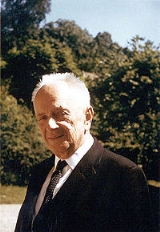
Theodosius Dobzhansky
Theodosius Grigorevich Dobzhansky
(Феодосий Григорьевич Добржанский)
(January 25, 1900 - December 18, 1975) was a noted geneticist, evolutionary biologist, and a leader of the Modern Evolutionary Synthesis. He was born in Russia (Ukraine) and attended Kiev University. He taught at the University of Leningrad before coming to the U.S. in 1927. In the U.S., he held positions at the Columbia University (1927-1930)and California Institute of Technology (1930-1940) , Columbia University (1940-1962), before moving to Rockefeller Institute in 1962. He remained at Rockefeller until his retirement in 1971. After retirement he continued working as an emeritus professor, moving to the University of California Davis. In his later years, Dobzhansky suffered from lymphocytic leukemia and passed away in 1975.
Dobzhansky was president of the Genetics Society of America, American Society of Naturalists, Society for the Study of Evolution, American Society of Zoologists and the American Teilhard de Chardin Association. He was awarded the National Medal of Science (1964) and the Gold Medal Award for Distinguished Achievement in Science (1969), and held more than 18 honorary doctorates. Among his well known works are and the Origin of Species (1937), one of the most important books defining the Modern evolutionary synthesis, The Biological Basis of Human Freedom (1956) and Mankind Evolving (1963).
(Феодосий Григорьевич Добржанский)
(January 25, 1900 - December 18, 1975) was a noted geneticist, evolutionary biologist, and a leader of the Modern Evolutionary Synthesis. He was born in Russia (Ukraine) and attended Kiev University. He taught at the University of Leningrad before coming to the U.S. in 1927. In the U.S., he held positions at the Columbia University (1927-1930)and California Institute of Technology (1930-1940) , Columbia University (1940-1962), before moving to Rockefeller Institute in 1962. He remained at Rockefeller until his retirement in 1971. After retirement he continued working as an emeritus professor, moving to the University of California Davis. In his later years, Dobzhansky suffered from lymphocytic leukemia and passed away in 1975.
Dobzhansky was president of the Genetics Society of America, American Society of Naturalists, Society for the Study of Evolution, American Society of Zoologists and the American Teilhard de Chardin Association. He was awarded the National Medal of Science (1964) and the Gold Medal Award for Distinguished Achievement in Science (1969), and held more than 18 honorary doctorates. Among his well known works are and the Origin of Species (1937), one of the most important books defining the Modern evolutionary synthesis, The Biological Basis of Human Freedom (1956) and Mankind Evolving (1963).
Sourced
- The evolution of life, and the evolutionary origin of mankind, are scientifically established as firmly and completely as any historical event not witnessed by human observers. Any concession to anti-evolutionists, suggesting that there are scientific reasons to doubt the facticity of evolution, would be propagating a plain untruth.
- In a letter to J. Kunamoto, 1972.
"Nothing in Biology Makes Sense Except in the Light of Evolution"
The American Biology Teacher, Vol. 35, pp 125-129, March 1973. Presented at the 1972 NABT convention.- Seen in the light of evolution, biology is, perhaps, intellectually the most satisfying and inspiring science. Without that light it becomes a pile of sundry facts -- some of them interesting or curious but making no meaningful picture as a whole.
- Does the evolutionary doctrine clash with religious faith? It does not. It is a blunder to mistake the Holy Scriptures for elementary textbooks of astronomy, geology, biology, and anthropology. Only if symbols are construed to mean what they are not intended to mean can there arise imaginary, insoluble conflicts. As pointed out above, the blunder leads to blasphemy: the Creator is accused of systematic deceitfulness.
